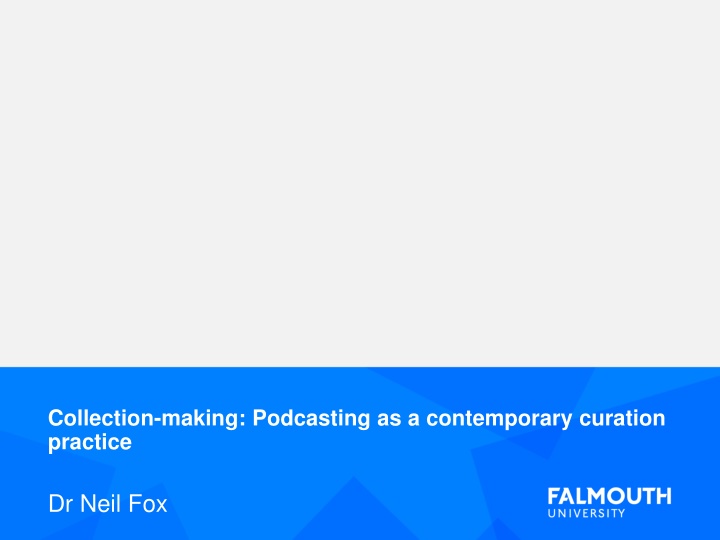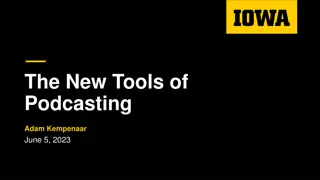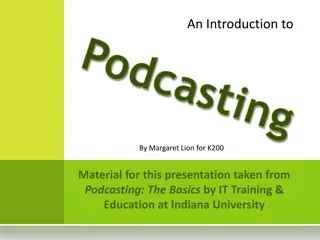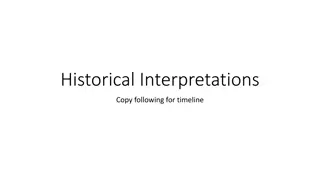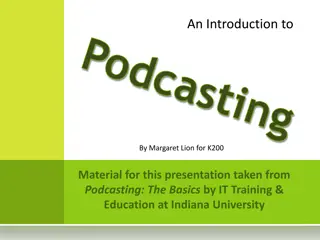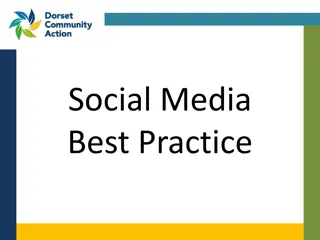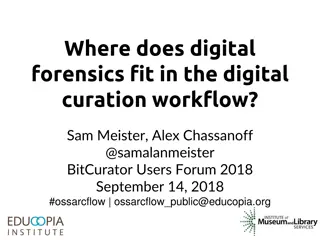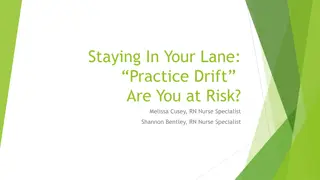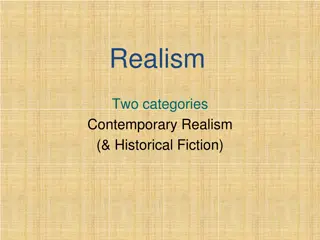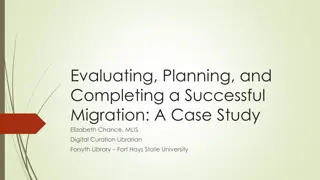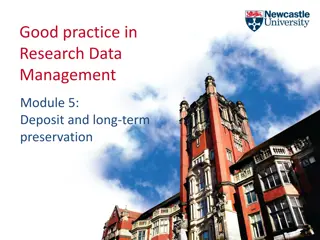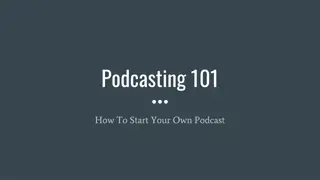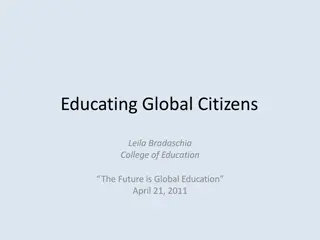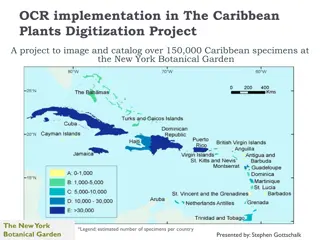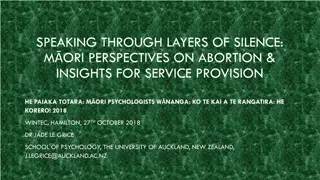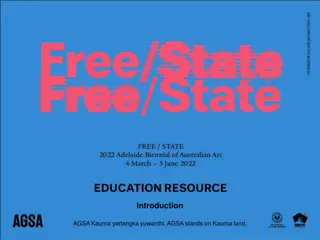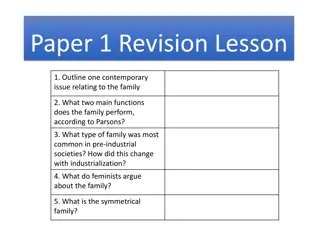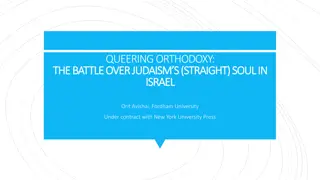Podcasting as a Contemporary Curation Practice: Insights and Perspectives
Exploring the evolving landscape of curation in the digital age, this collection delves into the transformative role of podcasting as a medium for contemporary curation. Dr. Neil Fox highlights the shifting dynamics of curation, drawing on insights from Terry Smith, Stewart Brand, and Hans Ulrich Obrist. The importance of bridging gaps, facilitating dialogue, and creating temporary communities is emphasized, along with the ephemeral nature of curatorial constellations. Les Back and Michael Bull offer perspectives on the value of sociological listening and involving practices of dialogue and interpretation.
Download Presentation

Please find below an Image/Link to download the presentation.
The content on the website is provided AS IS for your information and personal use only. It may not be sold, licensed, or shared on other websites without obtaining consent from the author.If you encounter any issues during the download, it is possible that the publisher has removed the file from their server.
You are allowed to download the files provided on this website for personal or commercial use, subject to the condition that they are used lawfully. All files are the property of their respective owners.
The content on the website is provided AS IS for your information and personal use only. It may not be sold, licensed, or shared on other websites without obtaining consent from the author.
E N D
Presentation Transcript
Collection-making: Podcasting as a contemporary curation practice Dr Neil Fox
Terry Smith (2012, 18). the title of curator is assumed by anyone who has a more than minimal role in bringing about a situation in which something creative might be done Dr. Neil Fox | @drneilfox
Stewart Brand (2015, 169) has been democratised by the net, so, in one sense, everybody is curating. If you're writing a blog, it's curating. So we're becoming editors and curators and those two are blending online Dr. Neil Fox | @drneilfox
Hans Ulrich Obrist (2015, 171) We are already starting to witness visionary acts of digital curating, and curating will surely change as a generation native to digital tools begin to develop new formats. This generation has grown up in an entirely new world. Perhaps by learning from them, we can learn something about our future Dr. Neil Fox | @drneilfox
Hans Ulrich Obrist (2015, 154) To create free space, not occupy existing space [...] the curator has to bridge gaps and build bridges between artists, the public institutions and other types of communities. The crux of this work is to build temporary communities by connecting different people and practices and creating the conditions for triggering sparks between them Dr. Neil Fox | @drneilfox
Hans Ulrich Obrist (2015, 58) curating after all produces ephemeral constellations with their own limited career span Dr. Neil Fox | @drneilfox
Les Back (2007, 14-15). one of the values of the kind of sociological listening I want to argue for is the importance of living with doubt in the service of understanding, of trying to grapple with moral complexity Dr. Neil Fox | @drneilfox
Michael Bull & Les Back (2003, 03-04). involving practices of dialogue and procedures for investigation, transposition and interpretation Dr. Neil Fox | @drneilfox
Michael Bull & Les Back (2003, 03). The kind of listening we envision is not straightforward, not self-evident - it is not was listening. Rather, we have to to work toward what might be called agile listening and this involves attuning our ears to listen again to the multiple layers of meaning potentially embedded in the same sound Dr. Neil Fox | @drneilfox
David Buckingham (2019, 55) a reflexive process, in which we constantly have to question our own preconceptions, interpretations and conclusions. It means avoiding the rush to judgement, and recognising the limitations of claims we make about what we know, and hence about how certain we can really be Dr. Neil Fox | @drneilfox
Hans Ulrich Obrist (2015, 39) To make a collection is to find acquire organise and store items [...] It is also inevitably, a way of thinking about the world. The connections and principles that produce a collection contain assumptions, juxtapositions, findings, experimental possibilities and associations. Collection-making, you could say, is a method of producing knowledge Dr. Neil Fox | @drneilfox
Simon Reynolds (2012, xxi) We ve become victims of our ever-increasing capacity to store, organise, instantly access, and share vast amounts if cultural data. Not only has there never been a society so obsessed with the cultural artifacts of its immediate past, but there has never before been a society that is able to access the immediate past so easily and so copiously Dr. Neil Fox | @drneilfox
The John Robb Tapes Episode 1: Nirvana Dr. Neil Fox | @drneilfox
Les Back (2007, 23). the past refuses to stay in its place that is behind us, it is unstable. Equally the present cannot simply explain the past from the point of the now Dr. Neil Fox | @drneilfox
Simon Reynolds (2012, xxv-xxvi) Nostalgia in the modern sense is an impossible emotion or at least an incurable one: the only remedy would involve time travel Dr. Neil Fox | @drneilfox
The Paris Review Episode 4: Missed Connections Dr. Neil Fox | @drneilfox
The Cinematologists Episode 84: Sleep Has Her House Dr. Neil Fox | @drneilfox
Hans Ulrich Obrist t (2015, 01) the task of curating is to make junctions, to allow different elements to touch Dr. Neil Fox | @drneilfox
Les Back (2007, 01). While the scale and complexity of global society may escape our total understanding, the sociologists can still pay attention to the fragments, the voices and stories that are otherwise passed over or ignored Dr. Neil Fox | @drneilfox
Black Men Cant Jump In Hollywood Dr. Neil Fox | @drneilfox
Racquel Gates (2018, 14). Representations do not do the work by themselves, and, to take it a step further, they may not even do the work that we presume them to do. When we refer to media as either positive or negative, we imply that the images push perceptions of blackness in one of two directions: either forward or backward. But is that their only function? What about resistant reading? And irony? And pleasure? Where do those factor in the equation? Dr. Neil Fox | @drneilfox
Black Men Cant Jump In Hollywood I, Robot Dr. Neil Fox | @drneilfox
Albert Camus (1950. in 2018, 29). there is no culture without legacy Dr. Neil Fox | @drneilfox
Les Back (2007, 22). as much as the here also contains the elsewhere, the now also contains the legacy of the past Dr. Neil Fox | @drneilfox
Hans Ulrich Obrist (2015, 47) so many archives are still homeless Dr. Neil Fox | @drneilfox
Albert Camus (1950. in 2018, 25-26). speak up, insofar as we can, for those who cannot do so Dr. Neil Fox | @drneilfox
Hans Ulrich Obrist (2015, 57) are a way of archiving or preserving the past Dr. Neil Fox | @drneilfox
Les Back (2007, 08). The listener s commitment to hearing places us on the side of the story from the outset. Yet, this is not a proposal for blind acceptance or unquestioning agreement. Being a partisan to the human story in all its manifold diversity does not exclude maintaining a critical orientation to it Dr. Neil Fox | @drneilfox
Charles Fairchild (2012 , 204) The people I spoke to [ ] never really knew who might be listening. Most took it on faith that someone was listening closely enough to care about what they were saying. This was enough for them to want to speak to be heard, to speak to make sense and to speak to be understood. In the process they began to hear the unheard and understand the unknown Dr. Neil Fox | @drneilfox
Reference List Back, L. (2007). The Art of Listening. Berg Publishers. Oxford. Buckingham, D. (2019). The Media Education Manifesto. Polity. Cambridge. Bull, M and Back, L., eds. (2004). The Auditory Culture Reader. Bloomsbury. London Camus, A. (2018). Create Dangerously. Penguin Modern. London. Clark, A. (2019). The Rep Report #7: Black 90s at BAM. Film Comment Podcast. 1/5/19. https://www.filmcomment.com/blog/the-film-comment-podcast-the-rep-report-7/. Accessed 30/12/19. Fairchild, C. (2012). Music, Radio and the Public Sphere. Palgrave Macmillan. London. Gates, R. (n.d.). Double Negative: The Black Image and Popular Culture. Duke University Press. Durham, NC. Obrist, H.-U. (2008). A Brief History of Curating. Jrp Ringier KunstverlagAg. Zurich. Obrist, H.-U. (2015). Ways of Curating. Penguin. London. Reynolds, S. (2012). Retromania. Faber & Faber. London. Smith, T. E. (2012). Thinking Contemporary Curating. ICI. New York. Dr. Neil Fox | @drneilfox
